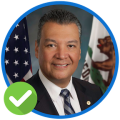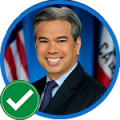Elect Braden Murphy to the Board of Equalization to keep California on the right track for progress.
The Position
The California Board of Equalization is composed of four members elected by popular vote to represent individual districts within the state. It is the only elected tax board in the country. The state controller serves in an at-large capacity as the 5th member. The board of equalization is responsible for managing taxation in the state, including in the areas of property, alcoholic beverage, and insurance. This includes oversight of valuation assessments on public utility and railroad property, mapping and assigning tax rates to geographic areas in the state, conducting assessment surveys and compliance audits, and administering tax exemptions. In California, board members meet each month in Sacramento to execute their duties of oversight, policy setting, and regulation to guide the work of the appointed executive director and board of equalization staff.
Board members are elected to four-year terms in office and cannot serve more than two terms.
The District
California’s 1st Board of Equalization district spans across most of inland California, from San Bernardino County to the Oregon border, and includes over 60% of California’s land area. California is the most populous state in the United States, and includes 58 counties and 331 million residents, with District 1 including approximately 10 million Californians. The demographic breakdown of the total residential population is 39% Latino, 16% Asian, and 7% Black. Of the 22 million registered voters in the state, 47% are Democrat, 24% are Republican, and 23% have no party preference. The most recent election results show that California voted for Joe Biden for president in 2020 by 29 points.
The Race
District 1 is currently represented by incumbent Republican Ted Gaines, who is running for reelection and was a candidate to replace Gov. Newsom during the 2021 recall campaign. There are four candidates running for this seat, including Democrat Braden Murphy and incumbent Republican Ted Gaines. Murphy’s campaign has raised $25,000 and has not received any donations from police, real estate, fossil fuel, or corporate PAC interests. Board Member Gaines’s campaign has raised $186,000 and has received donations from police and real estate interests.
The Recommendation
Braden Murphy, a policy advocate, lives in Folsom. According to campaign materials, he is running for election to bring fairness to California’s property tax system. He has not run for public office before.
Murphy was born with cerebral palsy and has been an advocate for universal health care and universal early childhood education. His platform draws a connection between the property tax burden on homeowners and the crisis of home ownership and homelessness in the state, and emphasizes the importance of ensuring that low corporate taxation doesn’t shift additional burden on to middle-class property owners. Additionally, Murphy sees the intersections of health-care access, education policy, and homeownership, and how the failure to transition to universal models can limit the capacity of families and individuals with disabilities to transition to a middle-class lifestyle. He would bring this knowledge to his equity efforts as a member of the board of equalization.
Murphy is endorsed by some progressive groups, including California Nurses Association and the California Democratic Party. He has also received the endorsement of many local leaders, including former Insurance Commissioner Dave Jones and Assemblymember Kevin McCarty. Based on our analysis, Murphy’s track record and policy positions demonstrate that he will be a progressive champion for the constituents of District 1 and will govern effectively in the best interest of this diverse district.
Elect Braden Murphy to the Board of Equalization to keep California on the right track for progress.
The Position
The California Board of Equalization is composed of four members elected by popular vote to represent individual districts within the state. It is the only elected tax board in the country. The state controller serves in an at-large capacity as the 5th member. The board of equalization is responsible for managing taxation in the state, including in the areas of property, alcoholic beverage, and insurance. This includes oversight of valuation assessments on public utility and railroad property, mapping and assigning tax rates to geographic areas in the state, conducting assessment surveys and compliance audits, and administering tax exemptions. In California, board members meet each month in Sacramento to execute their duties of oversight, policy setting, and regulation to guide the work of the appointed executive director and board of equalization staff.
Board members are elected to four-year terms in office and cannot serve more than two terms.
The District
California’s 1st Board of Equalization district spans across most of inland California, from San Bernardino County to the Oregon border, and includes over 60% of California’s land area. California is the most populous state in the United States, and includes 58 counties and 331 million residents, with District 1 including approximately 10 million Californians. The demographic breakdown of the total residential population is 39% Latino, 16% Asian, and 7% Black. Of the 22 million registered voters in the state, 47% are Democrat, 24% are Republican, and 23% have no party preference. The most recent election results show that California voted for Joe Biden for president in 2020 by 29 points.
The Race
District 1 is currently represented by incumbent Republican Ted Gaines, who is running for reelection and was a candidate to replace Gov. Newsom during the 2021 recall campaign. There are four candidates running for this seat, including Democrat Braden Murphy and incumbent Republican Ted Gaines. Murphy’s campaign has raised $25,000 and has not received any donations from police, real estate, fossil fuel, or corporate PAC interests. Board Member Gaines’s campaign has raised $186,000 and has received donations from police and real estate interests.
The Recommendation
Braden Murphy, a policy advocate, lives in Folsom. According to campaign materials, he is running for election to bring fairness to California’s property tax system. He has not run for public office before.
Murphy was born with cerebral palsy and has been an advocate for universal health care and universal early childhood education. His platform draws a connection between the property tax burden on homeowners and the crisis of home ownership and homelessness in the state, and emphasizes the importance of ensuring that low corporate taxation doesn’t shift additional burden on to middle-class property owners. Additionally, Murphy sees the intersections of health-care access, education policy, and homeownership, and how the failure to transition to universal models can limit the capacity of families and individuals with disabilities to transition to a middle-class lifestyle. He would bring this knowledge to his equity efforts as a member of the board of equalization.
Murphy is endorsed by some progressive groups, including California Nurses Association and the California Democratic Party. He has also received the endorsement of many local leaders, including former Insurance Commissioner Dave Jones and Assemblymember Kevin McCarty. Based on our analysis, Murphy’s track record and policy positions demonstrate that he will be a progressive champion for the constituents of District 1 and will govern effectively in the best interest of this diverse district.





